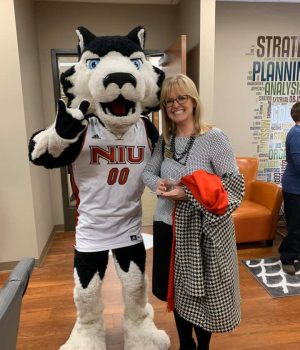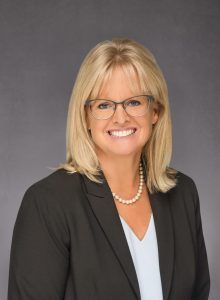

Lori Grubbs has announced that she is seeking re-election to the
DeKalb County Circuit Clerk’s office in the 2024 election. Lori has
spent the past three years as the elected Circuit Clerk, focusing on
increasing access to justice for all court patrons and implementing e-
record in the Civil Division. Lori has also established DeKalb County’s
first Self-Help Legal Center located in the DeKalb County Courthouse.
This center assists individuals representing themselves navigate
through the court system.
In 1994, Lori began working at the Clerk’s Office, starting as a Deputy
Circuit Clerk in the Civil Division. In 2004, Lori was appointed as
supervisor of the Civil Division and in 2020, she was elected to the
role of Circuit Clerk of DeKalb County where she serves in this role
today.
Lori is a lifelong resident of DeKalb County, currently living in Sycamore with her husband and two sons.
She believes that her experience and leadership play an important role as Circuit Clerk. “In my 30 years
at the DeKalb County Circuit Clerk’s Office, I have been fortunate to work closely with various
departments that make the courthouse run smoothly. It is a priority for me and my staff that every
person who enters the Clerk’s Office is treated with dignity and respect and has equal access to the
courts.” She looks forward to serving the citizens of DeKalb County for four more years.
Twenty-three members of the Illinois court and legal community attended the Self-Represented Litigation Network (SRLN) conference in Salt Lake City, Utah from September 18-21, 2024. This included five staff of the Illinois Supreme Court Commission on Access to Justice and the Administrative Office of the Illinois Courts (AOIC), representatives from five judicial circuits, the Chicago Bar Foundation, Illinois Bar Foundation, and more.
SRLN is a network of justice system professionals aiming for 100% access to civil justice. The network supports professionals focused on the question of how best to reform ALL aspects of the legal system (courts, legal aid, the bar, and non-legal partners) so that SRLs experience the courts (and indeed the legal system) as a consumer-oriented environment guided by the principles of equal protection and due process. The conference offered opportunities to network and learn from other states about programs and solutions they are implementing, and allowed us to share the incredible work being done in Illinois.
Stacey Weiler from the Illinois Bar Foundation presented “Nonlawyer Navigators in State Courts: An Update from the Field” which highlighted the Illinois JusticeCorps program. Avani Patel, AOIC presented on “Self-Help Platforms: Empowering People and Providing Baseline Access to Justice,” which highlighted Illinois Court Help. There was a session about the Illinois partnership with Suffolk Law Lab that highlighted a guided interview integrated with e-filing. Jill Roberts, AOIC and Roya Samarghandi, Chicago Bar Foundation presented “Building Connected Ecosystems of Resources for Self-Represented Litigants,” which highlighted the Safe Harbor Policy and some programs that utilize it, like the Court Library Access Centers. Kathryn Hensley and Sarah Song, AOIC presented “Listening to Their Voices: Getting Community-Based Feedback for Courts” highlighting forms user testing and community trust listening session projects.
Brenda Sprague, Executive Assistant to the Chief First Circuit Judge said “I believe [Illinois] is so advanced in self-help because of the work [the ATJ Commission] has done! Some state offices are just getting started […] it’s clear to understand how much the Illinois Access to Justice team has accomplished!” The ATJ Commission staff also saw how far we have to go, and we return to Illinois with renewed energy and ideas for improving access to justice in Illinois. One plenary speaker said “no matter what you do, it will not be enough AND it will be vitally important.” The ATJ Commission staff will keep this charge in mind as we continue to set strategic goals and priorities in order to make important, incremental improvements to our court system.


